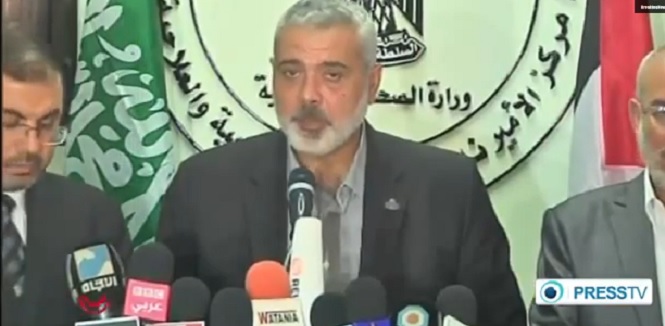Reconciliation talks between the two largest Palestinian factions have reportedly accelerated in recent days, with Hamas officials on Monday announcing a range of goodwill gestures toward Fatah, and Fatah officials on Tuesday revealing that top officials will soon travel to the Hamas-controlled Gaza Strip to discuss ending the two groups’ long-running feud. Fatah-controlled portions of the West Bank have been governed separately from Gaza since 2007, when Hamas fighters violently ended Fatah rule over the latter territory via a bloody week-long battle that saw at least 118 people killed and over 550 injured. News that the factions were making progress in unity negotiations – which would see Gaza and the Fatah-controlled areas of the West Bank brought under a single government – began to leak earlier this week, when Palestinian officials disclosed that reconciliation negotiations had been ongoing.
Assaf’s statement emerged following news reports claiming that Hamas and Fatah have already reached agreement on a unity government. He made it clear that no agreement had yet been reached as of yet, while stressing that efforts are ongoing. “Our hearts are open and our hands are extended for national unity,” he said.
On Monday Hamas Prime Minister Ismail Haniyeh announced that some Fatah members imprisoned by Hamas would be released, and a day later Fatah declared that Azam al-Ahmed, a senior official from the group, would soon travel to Gaza. Analysts quickly linked Hamas’s new-found willingness to compromise to the precipitous decline in domestic and international stature that the terrorist organization has recently suffered as a recent of several failed geopolitical gambles. McClatchy yesterday became the latest outlet to describe the downward spiral, assessing that Hamas “has sunk to a new low.”
Evidence of Hamas’ financial crisis is everywhere. Last week, Hamas lawmakers approved a budget of $589 million for 2014 – with no way to pay for 75 percent of it. The 47,000 employees on Hamas payroll have received reduced salaries since July. Money is so tight that Hamas canceled its mid-December “Hamas Day” celebrations. The financial crisis and lack of fuel have a direct impact on electricity, which is limited not only in homes but also in Gaza’s sewage plants, meaning millions of gallons of raw sewage are flowing into the Mediterranean Sea – and onto city streets.
A joint Fatah-Hamas Palestinian government risks complicating the Israeli-Palestinian peace process. Hamas remains committed to the destruction of the Jewish state, and would likely impose severe restrictions on the degree to which any unity government could interact with – let alone recognize – Israel. The Israelis, however, have over the course of several decades made functionally irreversible territorial concessions in exchange for among other things recognition and a Palestinian renunciation of violence. Should the Palestinians pocket those concessions and establish a government that violates previous agreement, it is unclear whether to what extent Israeli negotiators would be positions to offer further concessions in exchange for Palestinian assurances.
[Photo: BreakingNewTV / YouTube]




